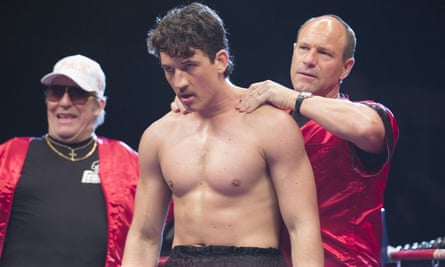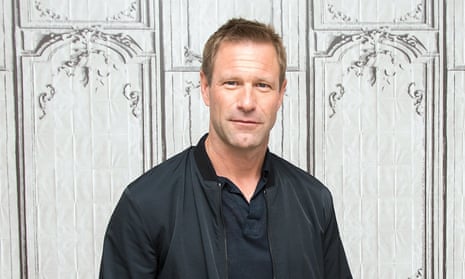Hi Aaron. In your new movie, Bleed for This, you play the legendary boxing trainer Kevin Rooney, and you transformed physically, right down to the fake receding hairline.
You know, so much of this job is physical. So in Bleed for This, we see that my character has gained weight, he walks on the back of his heels, and these things tell us he’s tired, depressed, pissed off. I mean, I’ve studied body language, I see what you just did, shifting your weight, one side to the other. I saw your thought.
Right. So was it a tough film to make, physically?
I have a saying: “If you’re sweating you’re doing it wrong.” You don’t need to sweat. When you sweat, you’re giving effort. And the goal is to do it with no effort. People ask me, “Why aren’t you sweating?” And I say, “Because I am making myself effortless.” (1) The physical is key. Like, I know your state of mind right now by how you’re holding your body, that tension in your chest.

Just to clarify, when you say that you don’t sweat, you mean literally?
I mean physically not getting hot. But real body language is hard to catch on camera. Like, now you have your finger at your ear. Nobody is going to let me do that on film. A producer will whisper to the director, and the director will walk over and say, “Maybe try it without the finger.” But then we rob the audience of reality. Because that finger in the ear is you telling me something. (2)
Is it harder still to capture that on the kind of big-budget blockbuster you sometimes make?
In the movie made with green screen, where the director doesn’t actually know what’s behind you? Where they say, “Oh, we’re going to have aliens?” Yes. It makes it hard to be specific. (3) And being specific is where good acting comes from. Being disciplined, too. But there’s also what I call having balls. It takes balls to be disciplined. It makes people uncomfortable.

Are you thinking of a particular incident?
There was the quintessential lashing out. I was doing a monologue I was unsure about, and I’ve got an extra who was paid to be there … he was falling asleep, and I said something (4). Because you think about the labour of so many people, and it’s like: “Can we maybe stay awake?” But anything I said was for the good of the film.
Would you handle it differently now?
Now I would say, “I need you. If you look at me like you’re listening, we can make a better movie.” I mean, I was an extra on Beverly Hills 90210, I see how extras are treated as cattle and it pains me. So if I’m working with an extra, I’ll find them at lunch and say, “Hey – you might not know it, but what you just did was awesome.”
You also play a supporting role opposite Tom Hanks in the true-story aviation drama Sully. Is there a particular skill to being the supporting actor?
This is related. In Sully, often I’m just listening, but I want Tom to know I’m completely engaged. My job is to define the hero for the audience. How do you do that? You are rivetted by him. Let’s take the ugliest, most boring guy. He’s the hero of your movie, OK? But then take a woman. The smartest, wittiest woman. And she can’t take her eyes off him. She laughs at his jokes. She dotes on him. And sexually? She cannot get enough of him. Now, what does the audience think?
She’s got low self-esteem?
No! We’ve turned a toad into a prince! And that is the task of the supporting actor. Tom is no toad, but that’s the job in Sully. It’s the same with Miles [Teller] in Bleed for This. (5)
Teller made his first movie, Rabbit Hole, with you in 2010. Do you feel paternal towards him?
I do. I’m constantly talking to him about mistakes I made, because I want him to do well. I don’t want him to fall into the traps I fell into.
As in movies or life choices?
Both. In this business, with the fame and money, there are traps. You can start believing things about yourself that won’t do you any good. And there are conversations nobody had with me that I wish they had. So, on Sully, I took the chance to ask Tom – top pro – how he handles certain things. Because if you get those things wrong, it damages a career.
You sound a bit rueful.
I’m 48. For 20 years I’ve made mistakes, and recovered from mistakes. I’ve asked myself tough questions. It goes back to balls. I’ve just tried to be a better person, and not take everything so seriously. Because I’m very sensitive. (6)
Bleed for This and Sully are released in the UK on 2 December.
Foot notes
1. There was much more about not sweating.
2. Itchy ear.
3. We both knew he was talking about Battlefield Los Angeles.
4. Then came a deep, sad sigh.
5. Teller plays boxer Vinny Pazienza.
6. If I was less emotionally stunted, honestly, we might have hugged.

Comments (…)
Sign in or create your Guardian account to join the discussion